Gorse lashings and fasting: Ancient Welsh Easter traditions

Graham Loveluck-Edwards
When I was little, my grandparents would always come and stay with us for the extended bank holiday weekend over Easter. Easter Sunday dinner therefore, always ended up being a very crowded affair.
All of us sitting round the dinner table, squashed up on unmatching chairs gathered from every room the house. I am sure many of us have similar traditions of our own, associated with the four-day break.
That sort of thing is not new, of course. Back in the 19th Century, the people of Wales, in particular the more superstitious country folk, had a raft of traditions and customs that were observed over the Easter weekend.
In many cases they dated back centuries. To a time when the religious significance of the Easter festival was altogether more to the fore than it is for many people today.
For context it is worth pointing out that Good Friday is “a holy day”. Which is where we get the word ‘holiday’ from. That is because working on Good Friday was prohibited.
Even working in the garden. It was considered immensely unlucky if you did anything that might “meddle with the earth” like digging. Even breaking cloth with a needle and thread was frowned upon. In fact, there was a widely held belief, and I quote “If you use a sewing-needle on this day [Good Friday] lightening will destroy you and your premises”. Which sounds pretty emphatic.
Superstitions
Good Friday was also a day of fasting. In other words, in addition to not being able to work or do anything productive, you could not eat or drink anything from the moment you woke on Good Friday until the moment you woke on Easter Saturday. That led to a few interesting superstitions which I guess were designed to help enforce this.
One which springs to mind; “if you endure thirst on Good Friday, whatever you drink during the year will not hurt you.”
Now I appreciate that to modern ears this might sound like a hollow promise. However, you need to bear in mind that until mains water became a common sight in households between the 1890s and the 1920s, clean drinking water was not as abundant as you might think.

For example, the principal drinking water supply of the Stow Hill area of Newport in Gwent used to be the Baneswell.
The pump which is connected to it is still there, in a street near the railway station. In the early 19th Century, it was described as “not a pure supply”, which is something of an understatement. It nearly wiped out the entire population of Newport. Drinking water from it was responsible for several cholera and typhoid epidemics which killed hundreds of people.
So, the promise that drink won’t kill you this year if you go thirsty on Good Friday was actually quite a bonus.
Similarly, there was a belief that bread baked on Good Friday would instantly turn sour and make the person who eats it ill. So once again, the message is clear. Best stick to your fast.
On Easter Day itself, merriment and feasting were as compulsory as the enforced abstinence on the days leading up to it. Traditionally, all the new baptisms in the parish were conducted as part of the Easter Day service in churches up and down the land.
There were also many places in Wales which had a tradition of burning large bonfires on Easter Day. Seemingly derived from the pagan Beltân fires associated with May and midsummer celebrations. At such ceremonies it was also a tradition to give people ‘the bumps’ as we would call it today.
Gorse
For me at least, here is the weirdest ancient Welsh Easter tradition.
In Glamorgan (it’s always us, isn’t it?) we had this most bizarre ceremony. The last man in the parish to have been married before Easter Sunday was marched up the nearest hill after church. His entourage were all the other men of parish brandishing branches of gorse.
When they reached the top, he had to give an address to all gathered, concluding with an order that all the men of the parish under 60 would have to be up and dressed by 6am, all men under 40 were to be up by 4am and all men under 20 were not to go to bed at all.
The following morning at dawn a team of enforcers (usually the church wardens, armed with their staffs of office) would go from house to house, to make sure this command was followed.
Anyone caught disobeying would be dragged from their beds to endure a spell in the stocks. Whilst in the stocks, the men of the parish would take turns to lash at their bare feet with strokes from the gorse branches.
This affair was very much a ‘men only’ thing. If a maiden happened to be caught watching the proceedings, she would have to give up her shoe and a kiss to whoever caught her #metoo.
Ysgyryd
The nicest bit of Welsh folklore we have about this time of year, however, comes from Monmouthshire. It was widely believed that a local landmark was created on Good Friday. The twin peaks of Mynydd Ysgyryd Fawr (The Skirrid).

Legend has it that at the exact moment of the crucifixion, there was a great earthquake near Abergavenny which caused part of the summit to collapse, giving it the staggered shape it still has today.
This legend resulted in the mountain becoming an important place of medieval pilgrimage. Also, its English name. ‘Skirrid’ is an anglicisation of the Welsh word ‘Ysgyryd’ meaning ‘shake’.
Cael Pasg hapus pawb. Have a happy Easter, everyone.
Source: Folk-Lore and Folk Stories of Wales by Marie Trevelyan (1909)
Learn more about Graham Loveluck-Edwards, his books, his talks and his walks visit www.grahamloveluckedwards.com or find him on YouTube or Facebook.
Support our Nation today
For the price of a cup of coffee a month you can help us create an independent, not-for-profit, national news service for the people of Wales, by the people of Wales.






When I was growing up in Swansea in the 1960s shops would shut for the afternoon on Good Friday.